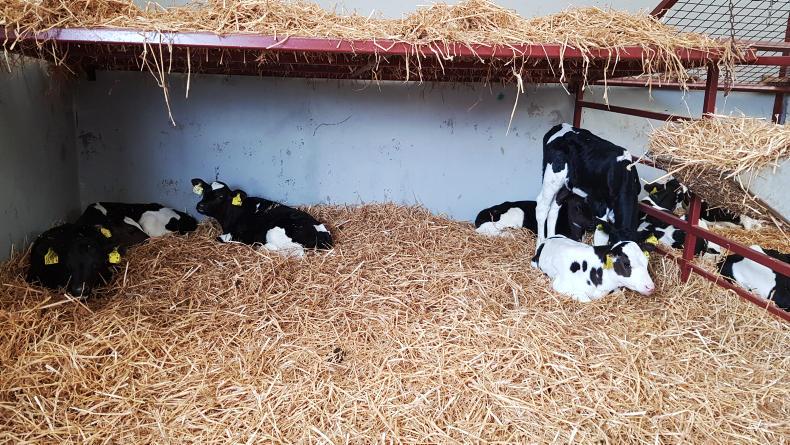Calves that are treated with antibiotics before weaning produce 493kg less milk in their first lactation compared with untreated calves, according to research conducted on dairy farms in the US.
Speaking at a calf-rearing event near Clogher on Thursday, Dr Sandra Godden from the University of Minnesota said that calf pneumonia has both short-term and long-term costs.
Labour, drugs and mortality are the main short-term effects of pneumonia, whereas increased risk of death or culling before calving and reduced milk yields are longer-term costs.
Another important long-term cost of pneumonia that affects farmers’ pockets is depressed liveweight gain in calves. Godden said that it costs £2.87 for every day that a heifer is delayed in calving over 24 months of age.

Calves are moved into straw-bedded group pens on the calf unit from three to six weeks of age on Malcolm Keys' farm.
Having good calf-rearing practices and housing matters economically, Godden told farmers at the event organised by Thompsons Feeds.
Clean, dry bedding and good hygiene with feeding equipment and housing, as well as adequate ventilation in calf sheds, were key factors highlighted by Godden to reduce the incidence of disease in young calves.
Pig farm approach
The event was held on Malcolm Keys' dairy heifer and beef unit near Clogher and was an excellent example of hygiene and attention to detail in calf-rearing.
Malcolm is a pig farmer and a recent entrant into dairy farming. His pig farming mentality was clearly seen in his approach to calf-rearing.
The accommodation was spotless, and calves are moved from pens throughout various stages of rearing in an all-in, all-out basis, which limits disease spread.
“This shed is not just clean because we are here today; it’s like this every day,” a speaker from Thompsons Feeds said.
Read more
Dairy management: treating for flies and culling cows
Keeping animals healthy in Cootehill
Calves that are treated with antibiotics before weaning produce 493kg less milk in their first lactation compared with untreated calves, according to research conducted on dairy farms in the US.
Speaking at a calf-rearing event near Clogher on Thursday, Dr Sandra Godden from the University of Minnesota said that calf pneumonia has both short-term and long-term costs.
Labour, drugs and mortality are the main short-term effects of pneumonia, whereas increased risk of death or culling before calving and reduced milk yields are longer-term costs.
Another important long-term cost of pneumonia that affects farmers’ pockets is depressed liveweight gain in calves. Godden said that it costs £2.87 for every day that a heifer is delayed in calving over 24 months of age.

Calves are moved into straw-bedded group pens on the calf unit from three to six weeks of age on Malcolm Keys' farm.
Having good calf-rearing practices and housing matters economically, Godden told farmers at the event organised by Thompsons Feeds.
Clean, dry bedding and good hygiene with feeding equipment and housing, as well as adequate ventilation in calf sheds, were key factors highlighted by Godden to reduce the incidence of disease in young calves.
Pig farm approach
The event was held on Malcolm Keys' dairy heifer and beef unit near Clogher and was an excellent example of hygiene and attention to detail in calf-rearing.
Malcolm is a pig farmer and a recent entrant into dairy farming. His pig farming mentality was clearly seen in his approach to calf-rearing.
The accommodation was spotless, and calves are moved from pens throughout various stages of rearing in an all-in, all-out basis, which limits disease spread.
“This shed is not just clean because we are here today; it’s like this every day,” a speaker from Thompsons Feeds said.
Read more
Dairy management: treating for flies and culling cows
Keeping animals healthy in Cootehill







 This is a subscriber-only article
This is a subscriber-only article











SHARING OPTIONS: